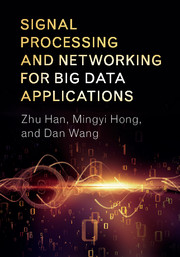Book contents
- Frontmatter
- Dedication
- Contents
- Part I Overview of Big Data Applications page
- Part II Methodology and Mathematical Background
- Part III Big Data Applications
- 8 Compressive Sensing-Based Big Data Analysis
- 9 Distributed Large-Scale Optimization
- 10 Optimization of Finite Sums
- 11 Big Data Optimization for Communication Networks
- 12 Big Data Optimization for Smart Grid Systems
- 13 Processing Large Data Sets in MapReduce
- 14 Massive Data Collection Using Wireless Sensor Networks
- Bibliography
- Index
12 - Big Data Optimization for Smart Grid Systems
from Part III - Big Data Applications
Published online by Cambridge University Press: 18 May 2017
- Frontmatter
- Dedication
- Contents
- Part I Overview of Big Data Applications page
- Part II Methodology and Mathematical Background
- Part III Big Data Applications
- 8 Compressive Sensing-Based Big Data Analysis
- 9 Distributed Large-Scale Optimization
- 10 Optimization of Finite Sums
- 11 Big Data Optimization for Communication Networks
- 12 Big Data Optimization for Smart Grid Systems
- 13 Processing Large Data Sets in MapReduce
- 14 Massive Data Collection Using Wireless Sensor Networks
- Bibliography
- Index
Summary
Introduction
The development of smart grid, impelled by the increasing demand from industrial and residential customers together with the aging power infrastructure, has become an urgent global priority due to its potential economic, environmental, and societal benefits. Smart grid refers to the next-generation electric power system which aims to provide reliable, efficient, secure, and quality energy generation/distribution/consumption using modern information, communications, and electronics technology. A distributed and user-centric system will be introduced in smart grid, which will incorporate end consumers into its decision processes to provide a cost-effective and reliable energy supply. In smart grid, the modern communication infrastructure [599] will play a vital role in managing, controlling, and optimizing different devices and systems. Information and communication technologies will offer the power grid with the capability of supporting two-way energy and information flow, quick isolating and restoring power outages, facilitating the integration of renewable energy sources into the grid, and empowering the consumer with tools for optimizing their energy consumption.
The inevitable coupling between information/communication technologies and physical operations is expected to present unique challenges as well as opportunities for smart grid. On the one hand, we are observing increasing integration between cyber operations and physical infrastructures for generation, transmission, and distribution control in the electric power grid. Yet the security and reliability of the power grid are not guaranteed at all times and some failures can cause significant problems for the producers and consumers of electricity. For example, the 2003 Northeast power blackout [600] showed that even a small failure in a part of the grid has cascading effects causing billions of dollars in economic losses. Nowadays, the consolidation of physical and cyber components gives rise to security threats in the power grid, which can result in power outages and even system blackouts [601], or substantial economical loss due to its non-optimal operation.
On the other hand, the anticipated smart grid data deluge, generated by the sensing and measurement devices and reinforced by communication and information technologies, provides us with the potential to enhance the security and reliability of smart grid. This “big data,” if effectively managed and translated into actionable insights, has the potential to increase revenue and operational efficiency, improve energy conservation, streamline the utilization of sustainable energy sources, and ensure grid resiliency.
Information
- Type
- Chapter
- Information
- Signal Processing and Networking for Big Data Applications , pp. 259 - 282Publisher: Cambridge University PressPrint publication year: 2017
